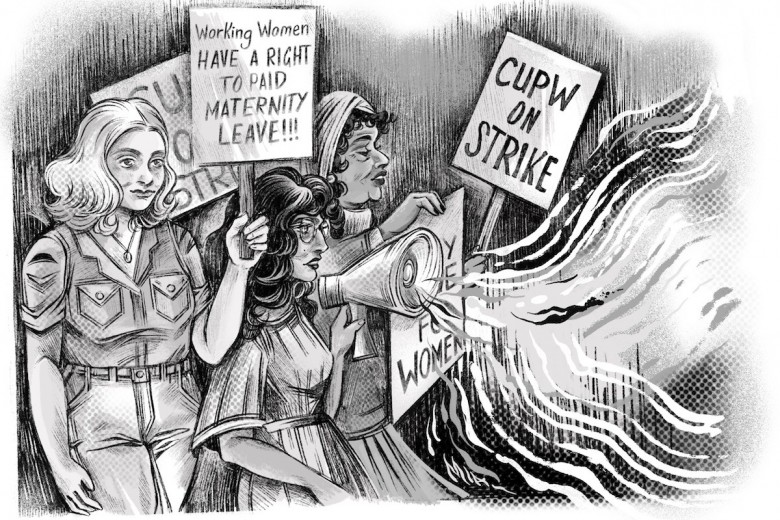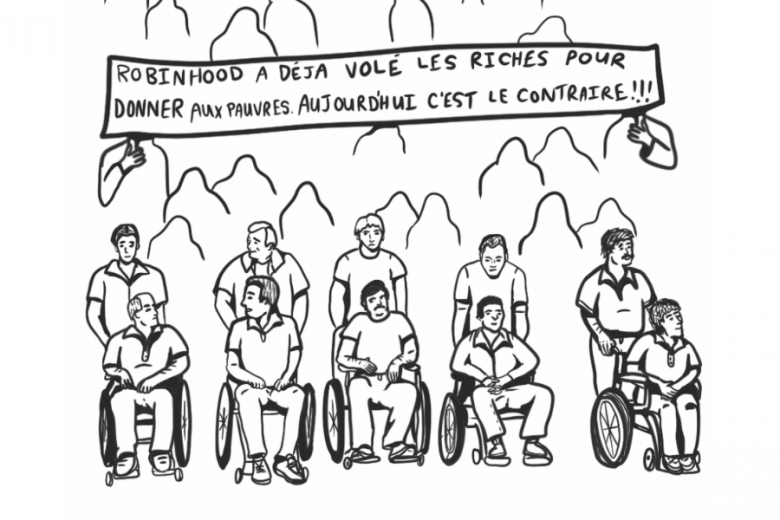Last fall, Quebec saw over 58,000 students participate in a week-long strike. From November 19 to 24, students at universities and junior colleges (CEGEPs) walked out on classes, held street marches, and formed picket lines in front of their schools to enforce strike mandates.
Now, another general unlimited strike is set for March 18 to 22, just before the Coalition Avenir Québec government’s budget reveal on March 21.
General strikes aren’t new to the students of Quebec: whether in 2005, 2012, or 2015, Quebec’s dissatisfied students have walked out on classes and subsequently won important gains. But this strike is different: it’s an interns’ strike.
Past strikes have always been in response to actions at the provincial level, usually tuition hikes or budget cuts. “But now it’s an aggressive strike, actually, because we’re asking the government for something that doesn’t exist,” explains Éloi Halloran, a sociology student at Université de Montréal and an activist with Comités unitaires sur le travail étudiant (CUTE), which advocates for the remuneration of student labour.
What they are asking for, specifically, is wages for all interns, and the benefits under Quebec’s labour code that come with receiving those wages: sick days; leave following domestic violence or a sexual assault; breaks and meal times; overtime pay; and rules on firing or punishing workers, for example.
“But now it’s an aggressive strike, actually, because we’re asking the government for something that doesn’t exist.”
Halloran says that, at its base, CUTE’s campaign for wages for interns is a feminist demand.
Social work, education, and nursing programs all require students to complete mandatory, for-credit internships organized through their school as part of their education. They’re also programs with higher numbers of female students. These internships are usually unpaid, unlike internships in programs with high numbers of men, like engineering and finance.
“This all comes down to the fact that we think that women’s work comes to them naturally,” says Gabrielle L-P, a social work student at Université du Québec à Montréal (UQAM) and activist with CUTE. She asked to use the initials of her last name out of concern for the security of her internship.
And unpaid internships also work to bar low income people or immigrants – people who cannot afford to work for free – from fields that require unpaid internships.
Organizing the interns
Interns are usually deterred from agitating for better working conditions by the vague promise that their internship could turn into in employment. Plus, interns are spread out in a number of different professions, making them difficult to organize. Schools are some of the only places where large-scale intern mobilization can happen.
Historically, the student movement in Quebec has been overwhelmingly francophone. This strike mirrors previous ones in terms of its demographics and participation. For example, UQAM, a francophone university that has long been a hotbed of leftist student activism, has over 14,000 students participating in the upcoming strike. In contrast Concordia, an anglophone university, has 900 or so.
Concordia is “typically the most mobilized of the anglophone campuses,” says John Hutton, the Concordia Student Union’s finance coordinator. “It has a longstanding activist culture, it’s got more of a francophone base, more of a working-class base than McGill, […] which has a lot of international students.”
Schools are some of the only places where large-scale intern mobilization can happen.
But November’s strike was joined by McGill University’s School of Social Work students, and on February 20, students at Vanier College – an English-language CEGEP – went on strike. The March strike will also be joined by two Concordia University student associations: journalism and the School of Community and Public Affairs. Communications students at Concordia went on strike in solidarity from March 6 to 8.
Nicholas Gertler, an executive at the Concordia Coms Guild, the association representing communications students, explained that students in the program had been expressing their disagreement with internship conditions for some time.
After journalism students at Concordia successfully adopted a strike mandate in January, communications students began flirting with the idea as well. “We all know something needs to change, we’ve been pressuring the department in other ways and nothing has changed, and here’s this thing that we can do,” explained Gertler. “The tide turned pretty quickly.”
Quebec’s Act Respecting Labour Standards lays out basic standards of decency for contract and salaried workers in the province, but does not cover interns. One of the demands of CUTE and the coalitions organizing the strike is that the line that excludes interns from the Act be removed from the law. Once interns are paid wages, they would be covered by the law as salaried workers.
“It’s this perpetual feeling of not being secure, you can lose your internship at any time,” says L-P.
“Not compensation, not bursaries.”
But some student groups don’t see a strike as the right tool to secure better internships.
Two student federations at the provincial level, the Fédération des étudiants collégiales du Québec (FECQ) and the Union étudiante du Québec (UEQ), launched a campaign of their own calling for better conditions, Stagiaires en solde. On February 18 they released a draft bill which was given to the Ministers of Labour and of Education.
“It’s a draft bill that proposes modifying the labour code to integrate interns into the basic protections given to workers,” explains Guillaume Lecorps, the president of the UEQ, speaking in French.
While the campaign does advocate for financial compensation for interns – which could mean salaries, bursaries, or financial allocations – the draft bill focuses primarily on affording interns the same protections as workers. The reason for this, Lecorps explains, is because discussions between the two student federations and the ministers involved have shown that there is already a consensus that the working conditions for interns can and should be improved.
“We all know something needs to change, we’ve been pressuring the department in other ways and nothing has changed, and here’s this thing that we can do.”
But because the draft bill does not delineate how interns should be compensated – leaving it up to the government – it has been denounced by CUTE.
“We’re still working towards a strike, because we’re not interested in being palatable, we’re not interested in being convenient, we’re interested in having a wage and having our rights recognized,” said L-P about the FECQ and UEQ’s efforts. “What we’ve been asking for since the beginning is a wage. Not compensation, not bursaries.”
One concern activists have about bursaries as compensation instead of wages is exemplified in the psychology doctoral interns’ bursary. In 2016, psychology students went on a four-month interns’ strike to protest their lack of wages during the 1,600 hour internships required for their degree. The Quebec government agreed to fund bursaries of $25,000 for psychology interns, which was set up in 2017.
Until recently, the psychology interns’ strike was considered a partial success story in the student movement, and was the catalyst to get other students and interns mobilizing around the issue.
“Even though it wasn’t a real victory it still proved that striking from your internships is something that can lead to some sort of gain,” L-P explained.
Now, just two years later, psychology interns at Université Sherbrooke have been notified that there isn’t enough money left in the bursary fund for all the students. Students will likely be forced to decide among themselves which interns receive the bursaries, unless the Minister of Education grants more bursaries (as the Fédération interuniversitaire des doctorant(e)s en psychologie, an inter-university group promoting the rights of psychology interns, has called on him to do). Next year, more universities are expected to face the same issue. It’s given strikers proof that bursaries cannot afford the same security as wages.
“The history of Quebec really shows that using the strike as a tactic gets you results.”
Lecorps, however, disagrees. He attributes the failure of the bursary program to the way it was negotiated by the government at the time. “Our goal is not to create policies that will be as precarious or unstable, that’s really not what we want.”
“It’s really an issue of properly framing the programs and making sure the measures we put in place work,” he continues.
At the provincial level, things are already moving around the issue of internship conditions. In January, a commission was created to survey the province about the issue of interns’ working conditions. But what CUTE and the coalitions involved in the strike are hoping for is that their tactics accelerate the province’s actions.
“The history of Quebec really shows that using the strike as a tactic gets you results,” says Hutton.
Though English schools’ history of student mobilizing is less significant, that doesn’t mean it’s non-existent, or that it doesn’t have the capacity to draw in large numbers.
“Organizing strikes is like a muscle. You exercise it, you remember how to do it,” Hutton adds. “So really, what it comes down to, is you’ve got to organize.”
Correction, March 20, 2019: This article stated that Nicholas Gertler is a former executive with the Concordia Coms Guild. He is, in fact, a current executive.


_1200_675_90_s_c1_c_c.jpg)




